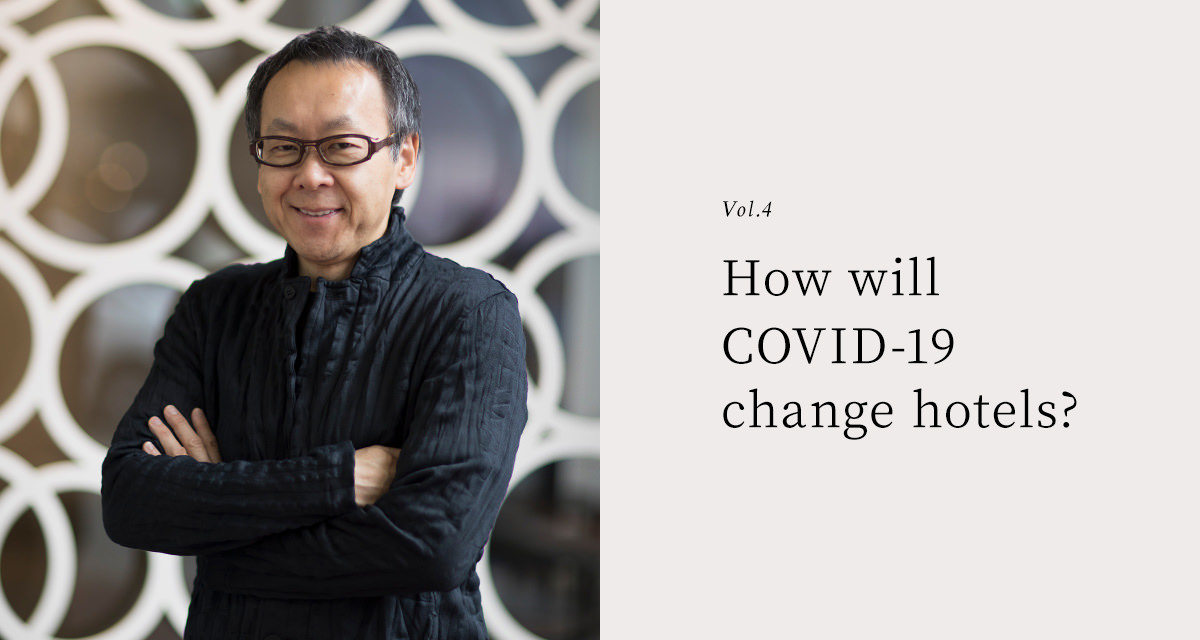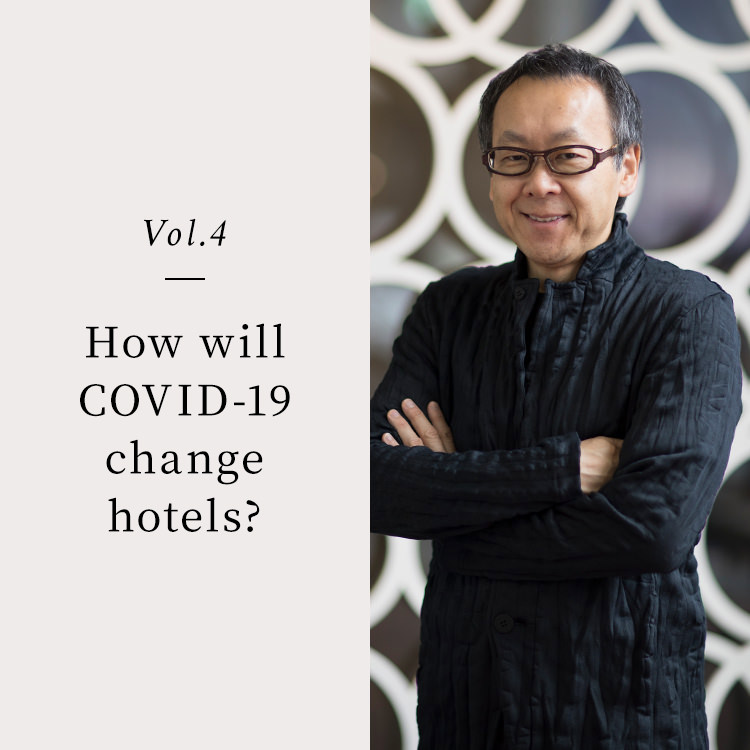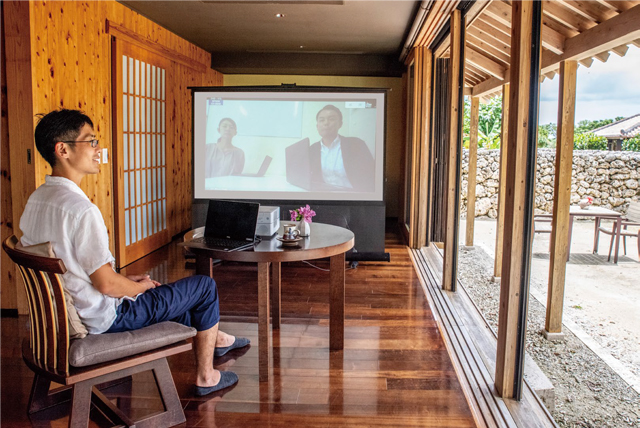

We are learning from modern business science and implementing reforms in order to gain a sustainable competitive edge. We believe that companies, including newcomers, that have established unique positions through repeated cycles of prosperity and decline in the face of market competition can maintain stability and sustain strong business performance. However, sometimes the ecosystems that have developed in competitive environments are destroyed in the blink of an eye, like the devastation caused by the massive asteroid that struck the earth roughly 60 million years ago. Based on my experience on the frontlines of hotel management, I feel that the COVID-19 pandemic will have that kind of impact. This is a crisis that cannot be tackled using the approaches that are normally considered optimal from a business theory standpoint.
The satellite impact 60 million years ago wiped out the world that the dinosaurs had long reigned over and created the conditions for the development of mammalian life over the course of many, many years and, ultimately, the appearance of Homo sapiens. How will the temporary extinguishing of hotel demand caused by COVID-19 change the tourism industry? How should we respond?
First, I believe that it will reverse the risk concepts of the hotel and resort industry. When I studied hotel management in the late 1980s, airport hotels were deemed the least risky, followed by city hotels. Resorts were considered to face the greatest amount of risk. Resort lodging is non-essential lodging. Guests pay their own expenses. There is a great deal of seasonality, and demand is strongly affected by disasters. This, we were taught, is why resort lodging was a high-risk field. However, having experienced the global financial crisis, the Great East Japan Earthquake, and now COVID-19, I believe that the resort field actually has the most stable demand. I believe that this is due to differences in motivation. Both companies and travelers would rather avoid business trips, but people who travel to tourist destinations do so because they want to.
Changes have also been brought about by IT advances. Advances in long-distance teleconferencing functions have gradually reduced the need for business travel, but the COVID-19 pandemic not only has changed how business trips are conducted, but also, through telework, is poised to change commuting itself. This will contribute to greater demand for tourist destinations and resorts. For example, until now, if a Thursday were a holiday, it would have little effect on tourism demand. However, in the future, if people were allowed to work remotely, they could stay at the resort for four nights, from Wednesday night to Sunday, working from the resort during the day on Friday. One of the changes being brought about by the COVID-19 pandemic is that it has resulted in the popularity and acceptance of telework. In the past, there was a clear distinction between work days and holidays, but in the future days spent at tourist destinations could also be work days.
Tourist destinations and resorts must rapidly respond to these changes. It is vital that they quickly prepare functions that meet these new needs, such as setting up solid Wi-Fi environments, creating environments conducive to teleconferencing, establishing prices for longer stays, reviewing and revising services for longer stays, such as room cleaning, and promoting separation of lodging and meals, including increasing meal variety. Hoshino Resorts' HOSHINOYA already has functions that meet many of these needs. We also plan to increase and expand the capabilities of KAI hot spring ryokan and RISONARE Western-style resorts to meet these needs.

Next, city hotels may achieve further growth in the post-COVID-19 era if they fully commit to shifting their targets from business customers to urban tourists. The regional cultures of cities around the world are strong tourism resources, and cities have captured a great deal of the tourism market in the past as well. Cities throughout Japan -- not just Tokyo, Osaka, and Kyoto -- have distinctive cultures and are rich with tourism resources. As teleconferencing and telework become widely accepted, we forecast that travelers to cities will increasingly shift from business trip travelers to urban tourists, so the model of "hotels that are just places for a person to sleep" will need to be transformed. The OMO brand, launched in 2018, is our first hotel brand focused on urban tourists. Unlike sightseeing areas, the providers of appealing content for visitors can be found within the cities themselves. Hotels must establish relationships with existing enterprises and individuals that provide regional cultural content in the area near the hotel, working together to design experiences for customers during their stays. Because of COVID-19, nearby dining establishments have started providing take-out, and even when economic activity picks up momentum, the number of seats will need to be halved to maintain social distancing. Hotels and restaurants have elements that can solve each other's issues -- hotels provide spaces where customers can enjoy regional dishes purchased as take out dishes, and restaurants with delivery functions can develop functions that make it easy for hotels to place orders. During this period, hotels and nearby establishments can easily create new collaborative structures, and the relationships they build can continue to be used even after the COVID-19 crisis.
Large hotels, the most common type of hotels in cities, have taken a negative view of food being brought onto their premises when it competed with their own food and dining functions. That has become well established as hotel common sense, so customers feel guilty bringing in food. Due to very low profit margins on services offered inside hotels, such as hotel food and dining, we now have limited service hotels with minimized services and room sizes. However, urban tourists need pleasant guestrooms, including roominess and functions, the freedom to enjoy the city's functions, and hotel services that support them during their stays. Vacation rentals have taken the lead over hotels in meeting these needs. The rapid growth of Airbnb is not the result of creating a new market, but in existing hotels' failure to meet changes in travel market needs. People staying in vacation rentals are not 100% satisfied with them. There is great promise for the fusion of the customer benefits of vacation rentals with hotel services including person-to-person onsite support and public areas.
OMO, which targets urban tourists, actively explores the potential for engagement with nearby restaurants and stores with which it can partner, providing services that are not bound by conventional hotel culture. In the future development and evolution of OMO, we have plans for providing guests with all of the benefits offered by vacation rentals.
Our new hotel brand, BEB, which is targeted at people in their 20s, has been praised for its new service, the first to actively promote bringing in food from outside the hotel. Instead of guests having to feel guilty about bringing back takeout food or drinks to their rooms, we have created a new public space we call a "Tamariba," where guests can enjoy their food and drink freely. This approach has produced positive results.
Ultimately, the COVID-19 crisis is quite different from the asteroid impact of 60 million years ago. It isn't poised to create unexpected change, but instead, I believe, to accelerate ongoing changes and expected changes to the travel market. It is important, first, that we overcome this crisis. I believe that the key to conquering the market will be overcoming the crisis while maintaining our human resources and financial power, swiftly adapting to meet accelerating changes in customer needs.






